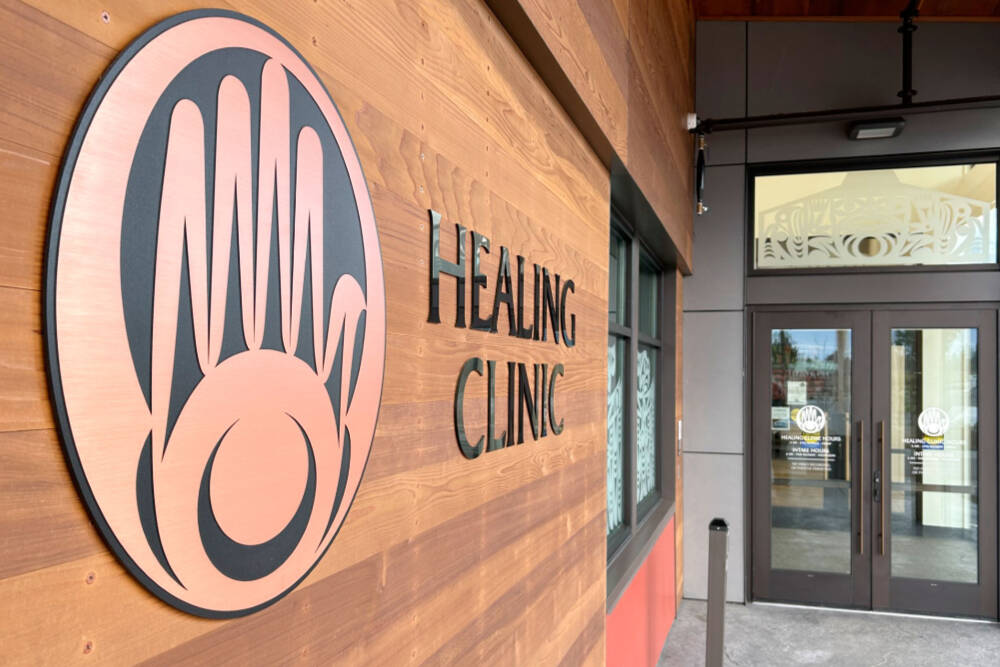After 18 months of operations, the Jamestown Healing Clinic is looking to expand its services as the number of patients continues to grow.
Molly Martin, the clinic’s executive director, told spectators at a Port Angeles Noon Rotary meeting on Jan. 30 that the clinic currently has about 160 enrolled patients and is growing by more than 10 new patients a month.
“We believe in seeing patients as soon as they are ready to seek treatment,” Martin said.
“We don’t run a wait list. If someone comes in to see us, we are going to see them that day and help them.”
The clinic, which opened in July 2022, is a certified opioid treatment center located in Sequim and owned by the Jamestown S’Klallam Tribe. Patients are given a controlled dose of Medications for Opioid Use Disorder (MOUDs) —typically liquid methadone — as a way of treating their opioid addictions.
But the Jamestown clinic is also able to provide an array of wrap-around services such as counseling and case management that can help people overcome their addiction and get their lives back on track.
Martin said some patients who began with daily doses now only visit the clinic once or twice a week.
The clinic accepts most major insurance programs and, unlike many other MOUD clinics, it also accepts Medicaid.
Martin said the clinic received state grant funding for its startup costs, but with billing to insurance, the clinic is financially stable and doesn’t require grant funding to operate.
In the coming months, the clinic hopes to add a 16-bed psychiatric facility next door to the Sequim facility and start up a mobile unit that makes trips to Clallam Bay.
The clinic currently has 54 staff members and could manage up to 200 patients, Martin said.
“We continue to grow by about 10 to 15 patients a month,” Martin said. “Sixty-five percent of our patients use our transportation service every day. We go as far out as past Joyce and all the way to the Hood Canal Bridge.”
The average age of a patient is 40, Martin said, and, unlike many other clinics, Jamestown’s patients are about a 50-50 split of men and women. Other clinics typically report 70% men and 30% women, but Martin said the Jamestown clinic has consistently been evenly split in patient gender.
The clinic is set up to serve adults. Martin said there are different requirements for youth, but the clinic can help direct young people to the appropriate services.
Martin added that 90% of the clinic’s patients come from Clallam County, which last year saw a significant increase in overdose deaths, largely driven by the synthetic opioid fentanyl.
“Fentanyl has really changed the game with everything that we do with treatment,” Martin said.
“It is ridiculously more potent than cocaine or heroin, the chance of overdose is much higher, (and) it’s hard to get people off of fentanyl than it is off of opiates say five or 10 years ago.”
The medications prescribed at MOUD clinics can be used to treat fentanyl addiction, but Martin said the process needs to be carefully monitored so patients are not given an inappropriate dose.
“There is no timeline for how long somebody needs to be on this medication,” Martin said. “There are lots of people who may be on these medications for years and years.”
There was some community push-back when the clinic was announced, and some Sequim residents organized in opposition to its opening. But Martin said those criticisms have disappeared, and that, in the 18 months the clinic has been open, only five calls to the police have been made, all for non-patients.
Opioid treatment medications “are one of our best tools for fighting the opioid crisis,” Martin said.
“They give patients an increased chance for long-term recovery, they reduce the risk of overdose from illicit substances by 60 to 80 percent, they increase our patients’ life stability, improve their mental and physical health and are shown to reduce criminal activities as well,” she added.



